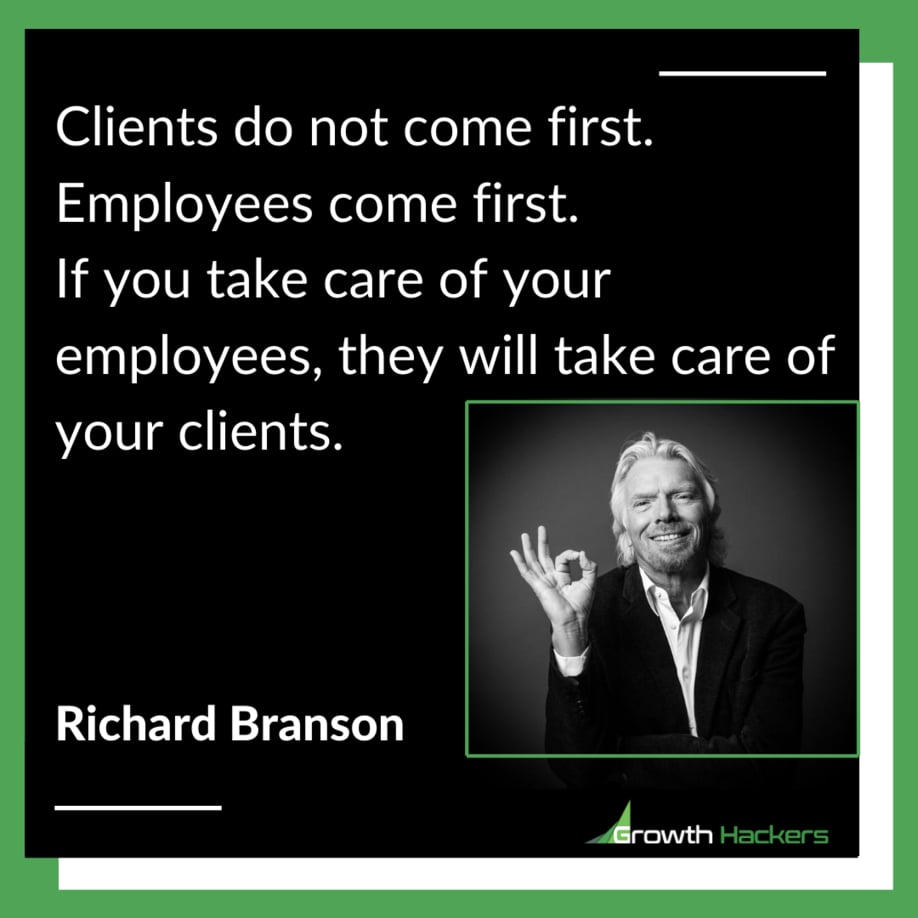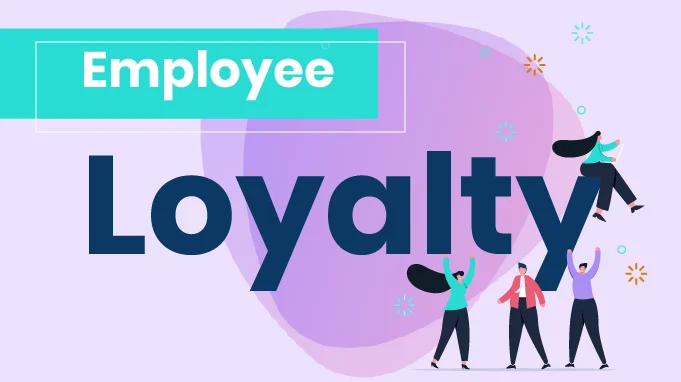Hello!
To increase employee loyalty is a critical component of an organization's success, and you need to make it a top priority. Happy and loyal staff who appreciate their jobs are eager to solve everyday problems while keeping motivation high on your team.
 How do you find these sets of employees, and more importantly, how do you retain them and boost their loyalty to your business?
How do you find these sets of employees, and more importantly, how do you retain them and boost their loyalty to your business?
Staff loyalty is built from the beginning of your hiring process and gradually increases or declines with the way you treat your team as they grow through the ranks. However, a recent study shows that over 81% of workers will willingly leave their current jobs for a more favorable offer.
It indicates that employee loyalty is on the low; hence, the need to put a structure in place that encourages staff loyalty. Increased staff loyalty among workers leads to a boost in retention and productivity.
Here are 15 ways your business can increase employee engagement and loyalty.
1. Understand 'Employee Loyalty'
Employee loyalty is the deep sense of allegiance a staff has towards their employer. A loyal employee is willing to make personal sacrifices to benefit the organization. Loyal employees don't start with an exit plan, but they give the employer ample time to replace them even when they need to leave. Although some staff may be naturally loyal than others, it rests on you to keep those with higher loyalty tendencies. They need a sense of validation for the work they do and also need to feel they are a part of the company.
2. Invest In The Recruitment Process
 A thriving workplace culture can lead to improved performance and better results and this starts during the recruitment process. The resources you put into a recruitment process can take a lot.
A thriving workplace culture can lead to improved performance and better results and this starts during the recruitment process. The resources you put into a recruitment process can take a lot.
But when done right, it pays off when you find the right employee. You need to be selective on the front end, so you lose fewer people as the years go by. When you hire well-matched employees, retaining them takes less effort because they are naturally inclined to show loyalty to the organization.
Additionally, as you recruit new staff, introduce the candidate to others on your team. Give them tasks to complete or share samples of past work, and screen their personality. Their values should match those of the organization. A well-matched person naturally blends with your other team members, complementing their skills and fitting right in with the overall culture.
3. Remove Uncertainty
It is not in doubt that the present time job positions come with uncertainties than in previous years. There have been multiple changes in the economy, and innovations likewise disrupt previously stable job markets. In a study recently carried out by University College London, these pervasive uncertainties can create a stressful atmosphere that leaves employees feeling miserable.
Although it does not single handedly rest on a company to fix an uncertain economy, employers can at least try to make work more stable and predictable by keeping their employees in the know and warning them of imminent change.
4. Involve Your Employees
 By involving your employees, not only you will improve their loyalty, you will also enhance employee performance. When employees feel disconnected from the company, it makes them disloyal. Most employees are disloyal because they feel overlooked or undervalued. It arises due to the lack of staff involvement in the affairs of the company or making their roles seem useless.
By involving your employees, not only you will improve their loyalty, you will also enhance employee performance. When employees feel disconnected from the company, it makes them disloyal. Most employees are disloyal because they feel overlooked or undervalued. It arises due to the lack of staff involvement in the affairs of the company or making their roles seem useless.
What you need to do is develop strategies to get your employees involved in the day to day running of the company. It doesn't mean all your employees should be management staff. What you need to do is make them know their role, no matter how little is essential to the overall growth of the business.
5. Offer Competitive and Fair Compensation
An employee expects you to pay them as much as they could earn doing the same job elsewhere. They also expect equal pay as their peers. And it's irrespective of the fact that those peers may have negotiated their salaries. Once they know that you pay them less for the same job as others, they are bound to feel devalued. The best means of establishing competitive fairness is to place everyone's compensation publicly.
Remember that your employees spend over half of their lives daily at work and don't want them to feel valued as much as others. So you must reward the effort and time they put in by compensating them adequately and fairly.
6. Recognize and Reward Outstanding Performances
Besides appreciating the little day to day efforts your employee puts in to keep the company going, there are outstanding performances that ought to be recognized and rewarded. When an employee delivers results that go beyond expectations, take the time to reward their efforts.
Special recognition and rewards go a long way to build loyalty among your staff. It lets them know you see them and encourages them to do more.
7. Always Be Transparent
 In every relationship, it is essential to let everyone know what is going on and where things stand. You can't expect to hide things from people and still get their loyalty. Therefore, your employees deserve to know the situation of things in the company. If you're doing well, let them know. If the company is headed towards hitting the iceberg, get them informed early.
In every relationship, it is essential to let everyone know what is going on and where things stand. You can't expect to hide things from people and still get their loyalty. Therefore, your employees deserve to know the situation of things in the company. If you're doing well, let them know. If the company is headed towards hitting the iceberg, get them informed early.
Beyond making them loyal to you, they could make creative contributions that would help the company. Through the use of intranets, companies can use hubs like this to distribute information, connect with co-workers and executives to ensure that their employees feel involved.
8. Give Constructive Feedback
Feedbacks are crucial in the workplace. It's not just when employees don't get things right. You should make room for constructive feedback to your employees. Remember, when giving valuable feedback, do not berate the employee. Instead, let them know what they did right and areas they could have done better and how they could do better moving forward.
You can make it a weekly thing where you get to analyze their performances and determine the best way to move forward. It fosters a sense of belonging and responsibility in the mind of your employees. The result is unwavering loyalty to you or your company.
9. Listen and Address Concerns
You cannot always satisfy everyone, well except you are ice-cream! The fact is that people will still complain about one thing or another. If they aren't complaining about the coffee machine not working, it would be the small-sized office partition or even a colleague they don't want to share an office with.
As mundane as some of the complaints might be, you don't have to ignore them. By listening to them, you give them the impression that you care. And beyond listening to them, you should also try to address their concerns as much as possible. You can also easily create an online survey to capture this information.
10. Plan Regular Check-Ins
It's wrong to assume that your employees are happy and all is well because they complain. Some employees are the quiet type and will likely not share their grievances. They hope you reach out and engage them. To retain these kinds of employees in the fold, regularly check-in on them. The number of unhappy staff is usually less when you check-in on them frequently.
Check-ins apply mostly to staff who work remotely or employees whose nature of work require them to be out on the field most days. like sales executives. Why? Because you cannot see them and access their daily grind. Thus, planned check-ins are quite essential to gauge your team's well-being and overall state at work.

11. Create More Impromptu Promotions
The longer your employees are with your organization, their needs begin to evolve. One way to inspire their loyalty is to help them grow and offer them opportunities for advancement tailored to their skills and goals. Also, go a step further by helping an employee create a new job based on their expertise or rotating between different roles. If an employee has the flexibility to fit their duty to their needs, their chances of leaving will reduce their chances of finding what they need.
12. Create a Non-Toxic Working Environment
 A toxic work environment can sap the energy out of your employees. It makes it uncomfortable for them to give their best. The worst part is that it exposes your company to unnecessary staff turnover.
A toxic work environment can sap the energy out of your employees. It makes it uncomfortable for them to give their best. The worst part is that it exposes your company to unnecessary staff turnover.
According to Ajilon, three out of every ten employees would quit if the workplace is toxic. Most of the time, it's a function of a bad boss or an overbearing supervisor. You need to create a conducive workplace for your employees.
13. Promote Friendships At Work
Friendly employees tend to remain at their jobs much longer. These types of relationships support accountability, and support among co-workers is essential for the well-being of individuals in the company. Friendship should always be encouraged within certain boundaries.
14. Celebrate Employees' Milestone Achievements
There are milestone achievements that mean so much to your employees, and you need to be part of it. Things like birthdays, marriage anniversary, work anniversaries, and all, are crucial celebrations people do.
Celebrating these milestone achievements with your employees portrays you as a friend or family. It makes them see you as part of their lives. They would go out of their way to give their best as though they were doing it for a friend or a family member.
15. Mentor Train and Develop Your Employee
Though you employed people to add value to your company, you still have to add value to their lives. As they contribute their quota to move your company forward, you should create avenues to grow and better your staff.
Invest in mentorship, training, and development programs for your employees. You will make them more loyal, and also give them the capacity to become better at their responsibilities.
Increasing Employee Loyalty
 CEOs want to see their organizations thrive more than its competitors, but sometimes the problem might be internal culture. If a working environment is not conducive, it could negatively affect employee morale, which affects productivity.
CEOs want to see their organizations thrive more than its competitors, but sometimes the problem might be internal culture. If a working environment is not conducive, it could negatively affect employee morale, which affects productivity.
Happy workers make more efficient workers, and having specific measures in place can help increase revenue for the company as well as employee loyalty. By applying the points mentioned above, organizations can quickly build an engaging work environment for their employees.
- Improve Brand Loyalty By Getting A Greater Customer Service Experience
- How to use Instagram to build Brand and Customer Loyalty?
Thank you!
Subscribe to our newsletter! Join us on social networks!
See you!






